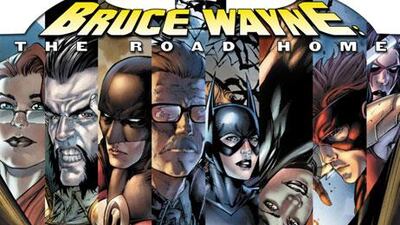The comic book is surely one of the classic symbols of America. The image of a young boy excitedly rushing to his local store to purchase the latest instalment of Batman or Superman, poring over the latest superhero exploits of Bruce Wayne or Clark Kent, has been indelibly marked on the country's consciousness since the 1930s.
Except, like most temples to 20th-century pop culture, the comic book and its shops are under threat.
In the 1990s, the Los Angeles Times reported last week, there were almost 9,000 retailers selling comic books. Now the figure is more like 2,000 - and sales of the comics themselves continue to nosedive.
It's tempting to suggest, then, that comics are an increasingly moribund format. In a world where most people are now exposed to superheroes via blockbuster movies and video games, relaunching Spider-Man in comic form as a half-black, half-Hispanic character called Miles Morales seems increasingly desperate. Comics, it seems, need a superhero of their own.
And it may come, sooner than you can imagine, via your digital device. Starting today, DC Comics - publisher since 1934 of Superman, Batman, Wonder Woman and many others - will make all its publications available simultaneously as digital downloads, readable on iPads, tablets, laptops and mobile phones.
It seems almost perverse that it has taken this long for one of the largest comic-book operations in the world to catch up with digital media. Comics were previously made available on iPads, but readers had to wait for months after the release of the printed versions. It's like Coldplay releasing an album as a CD this week but withholding the download until November: patently ridiculous in our always on, want-it-now culture.
"Comics do work really well on digital devices," agrees the senior vice president of digital at DC Comics, Hank Kanalz. "The art is backlit, and the colours really pop. You can view by panel or zoom in on areas you want to examine more closely - it's a very different experience from print. You also don't worry about creasing the spine of your book."
That's supposing people will actually buy the book as well. It may well be that, as the music industry has discovered, the physical product entices a small but vocal community of die-hards - and the digital element attracts the mass-market. Unsurprisingly, Kanalz disagrees, for now.
"I think comics are different," he says. "Holding and collecting comics is a unique experience that won't be substituted by the digital format. I've been collecting physical comics for decades, and will continue to do so. I have my favourites that I will always collect.
"However, I'll probably sample new books digitally first. I can't be the only one who does this, right?"
No, but are there enough people like Kanalz to offer succour to the comic-book stores? The retailers haven't been completely overlooked: DC's plan is to sell a print edition at US$4.99 (Dh18) with a download code, and a stand-alone digital version for $3.99. So comic-book collectors can visit their local store, keep their print copy pristine, and read the likes of Justice League on their iPads on the way home on the subway.
Intriguingly, DC's move to offer simultaneously digital publishing also coincides with its "New 52" project, where much-loved characters such as Batman and Wonder Woman will start their stories all over again, from issue one. As Kanalz explains, DC lackeys aren't desperately scanning in copies of comics from 1952, but instead rebooting the legendary characters, giving the company the "opportunity to tell new stories and bring in new fans who won't need to know the vast, intricate back-stories created over the years.
"It also creates a perfect opportunity for our digital efforts - new fans easily can jump in and enjoy," he admits. "I don't look at this so much as hitting the reset button as I do providing a good starting point for new readers."
New readers are, of course, what all comic-book publishers - and not just DC - are desperate for. And it may be that because of the sheer ease of delivery, a whole new generation of fans will download an edition of Batman after, perhaps, seeing the latest film. They may not have gone searching for it in a hard-to-find comic-book store - as painful as that may be for the retailers.
"The underlying message is: 'Look, there are these things called comics: go try them!'" says Kanalz. In whatever format that might be.
The New 52 is available from today, on www.dccomics.com.

